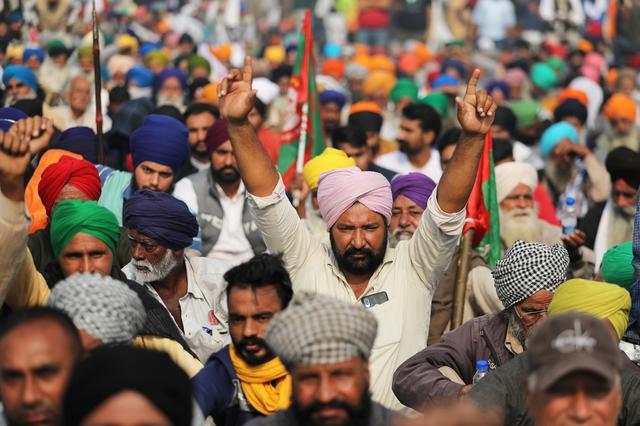- Jan: Day 1 (17/1/18)| Day 2 (18/01/18) | Day 3 (23/01/18) | Day 4 (24/1/18) | Day 5 (30/1/18)
- Feb: Day 6 (1/2/18) | Day 7 (6/2/18) | Day 8 (7/2/18) | Day 9 (8/2/18) | Day 10 (13/2/18) | Day 11 (20/2/18) | Day 12 (21/2/18) | Day 13 (22/2/18)
- Mar: Day 14 (6/3/18)
This post is essentially a compilation of tweets from Gautam Bhatia, Prasanna and SFLC to understand how the Aadhaar hearing happened in the Supreme court.
Day 15: 07 March ’18
Senior Advocate Arvind Datar followed by Senior Advocate P Chidambaram counsel for petitioners arguing.
- Arvind Datar (AD) continues the case for the Petitioners.
- Says that Chidambaram will argue the issue of money bill in the afternoon. Hands over written submissions on the topic of money bill and requests the Court to go through it, because he has been asked to finish by 1 PM.
- Briefly indicates the distinction between Money bills and appropriation bills, and says that at the highest, Aadhaar is a financial bill that requires Rajya Sabha approval.
- Discusses how Aadhaar has been made mandatory for mutual funds. He reads out a letter he has received that contains the words “I hereby give my consent…” followed by all the requirements that follow.
- Says that it’s not consent in any meaningful sense when it takes the form “you consent or else your bank accounts will be blocked.”
- Says “is this what consent means in a democracy?”
- Asks what making Aadhaar mandatory for insurance policies has to do with the PMLA.
- Says that even if the Court was to uphold Aadhaar, his alternative submission is that the Aadhaar Act is limited to subsidies taken from the consolidated fund of India, and can’t be made mandatory for anything beyond that.
- reads out the Statement of Objects and Reasons of the Aadhaar Act to substantiate this point.
- Justice Bhushan says that Section 57 of the Act allows it to be used for other purposes as well, like driving license.
- Datar says that no law says that not having a driving license will disentitle you from getting an entitlement under an entirely different scheme.
- Justice Chandrachud says that another argument could be that once you bring in the private sector through Section 57, the nexus with money bill is lost.
- Datar says that this is exactly his next point. He comes to Section 57.
- Says that as a matter of fact, the Rajya Sabha specifically recommended the deletion of clause 57.
- Reads out a speech in the Lok Sabha where it was specifically pointed out that S 57 goes far beyond the specifications of a money bill.
- Quotes the importance of bicameralism in the constitutional scheme.
- Says that if it was not a money bill, and it had gone to Rajya Sabha, there would have been an opt out clause, and S 57 would have been deleted.
- Says that at its highest, consent is only limited to the issue of subsidies.
- Says that from 1872, in Indian law, the word consent is legally understood by referring to the Indian Contract Act. See section 13.
- Says that a contract is not free if one party is in a position of overwhelming dominance over the other.
- Reads out the debates in the US around the social security number, which warned against nationwide automated personal data systems.
- Reads out extracts from US Senate Debates, where senators spoke against SSN as a universal identifier. “It is time to stop this drift towards a society in which a person is reduced to nothing more than a number.”
- Says that these debates happened in the American Senate in 1974. After this, the US Congress amended the social security Act which made it unlawful to deny any individual any entitlement just because he refuses to reveal his social security number.
- Says that worldwide there is a recognition of the dangers and there is a move towards limiting data, while Aadhaar is going the opposite way.
- Says that his next submission is that to enrol or not to enrol in Aadhaar is an exercise of an individual’s delusional autonomy. To decide whether or not to part with personal information is a fundamental choice under the Constitution, affirmed by the privacy judgment.
- Says that that basic principle is being violated because today, it is virtually impossible to survive in society without an Aadhaar. It is for the Court to decide whether this manner of coercion is permissible in a rule of law society.
- Says that the consent provisions of the Aadhaar Act are rendered meaningless when you say “please consent, or we’ll close your bank account on March 31.”
- Says that Section 57 amounts to excessive delegation of essential functions.
- Says that to the extent that Section 57 is limited to primary legislation, it is hit by Articles 14 and 21.
- Says that it’s shocking that Section 57 allows even a private contract to override the provisions of the Act.
- Justice Chandrachud asks what compelling state interest could there be for Section 57 authorising the private sector in the context of mandatory Aadhaar?
- Arvind Datar takes examples of various temples making Aadhaar mandatory to enter. Asks “where are we going?”
- Says that “any purpose” under Section 57 can’t mean “all purposes.”
- Says that the words “as specified by regulations” have been used some twenty-six times in the Act. He says that when you’re talking about issues like core biometrics, it can’t be left to regulations.
- Says that Section 7 of the Aadhaar Act, that allows it to be made compulsory for subsidies, is manifestly arbitrary. He says that this is because to get my Aadhaar I have to show one of eighteen approved proofs of identity, including ration card, but the moment get an Aadhaar, all those proofs of identity become effectively invalid.
- You are making the livelihood of people dependent on a machine, that works on a probailistic basis. The right to life is being made contingent on an inherently faulty machine.
- Cites the judgement of the Supreme Court in Swaraj Abhiyan’s judgment, that directed that in drought affected areas, the requirements of a ration card must substituted by another valid proof of identity.
- Says that the Regulations providing for deactivation and cancellation of Aadhaar have no procedural safeguards. He says that the regulating stating that if a child’s details are not updated in two years, her Aadhaar will be deactivated, is “utterly obnoxious.”
- Comes to the issue of income tax and the Binoy Viswan judgment. He says that Binoy Viswam must be reconsidered in the light of the privacy judgment.
- Says that the AG argued that Aadhaar is so foolproof that it will weed out all frauds. In fact, it turns out that it’s so extraordinarily foolproof that you can put twelve zeroes, and you’ll get your income tax return accepted, and a refund to boot.
- Says that the compulsory linking of PAN is entirely disproportionate.
- Says that at its highest, deduplication can be a one time exercise. Why do you need permanent linkage to achieve that purpose?
- Says that his last argument is about pre-Act actions. He says that delegated legislation cannot be subsequently ratified if it violates fundamental rights.
- Says that what is most shocking about Aadhaar is that despite court orders, you go on violating and violating and violating.
- Says that, in conclusion, there must be guidelines for deletion of data.
- Court reassembles after lunch.
- Arvind Datar will complete his submissions for the petitioners, followed by Senior Advocate P. Chidambaram, who will begin his arguments on Money Bill.
- Arvind Datar takes the court through the interim orders passed in the case.
- Shows the Court a screenshot from five minutes ago from Gujarat’s NEET website that says Aadhaar is mandatory for NEET, last date being 9 March. Says that it is a clear violation of the interim orders of the Court.
- Says that despite the orders of the SC, nobody is following them. It is a case of contempt of Court. Brings the attention of the court to the interim order passed on 15th December, 2017.
- Asks the Court (yet again) to pass an interim order pending conclusion of the case.
- Last submission: to consider the possibility of including guidelines for deletion of data and for opting out of Aadhaar.
- Concludes by quoting Justice Vivian Bose’s opinion in State of West Bengal vs Anwar Ali Sarkar. “It matters not how lofty the motives are… the question is can fair minded people regard it with equanimity and see it as just, fair, and reasonably.” Says that this national extension of Aadhaar cannot be justified in a sovereign democratic republic.
- Attorney General says that it has not authorised CBSE to make Aadhaar mandatory for entrance exams. Further says that those interim orders of the court can apply only to pre-Act actions and not after the Act came into force.
- Further discussions on Aadhaar being made mandatory for NEET. Bench says that any such authority has the right to ask for some kind of identification but not exclusively Aadhaar.
- Bench says that we will consider the relief for this particular case at the end of Mr. Chidambaram’s arguments. Petitioners press for relief in case of Aadhaar-bank account linking as well.
- Justice DY Chandrachud says that we cannot extend the dates for linking at the last moment because the financial institutions will be in a state of uncertainty till then thinking 30th to be the last date for linking.
- Says that they will deal with the issue of interim relief, and that it can’t be left to the last minute.
- P. Chidambaram commences his arguments on Money bill.
- Questions if one can bypass the scrutiny of Rajya Sabha by terming a bill as Money Bill.
- Reads Article 107 pertaining to the introduction and passage of bills.
- Further reads Article 117 of the Constitution relating to the provisions on financial bills. Explains when a bill is a financial bill. Says it can only be introduced in Lok Sabha.
- Now comes to Article 110. Says that money bill is a subset of financial bill. Distinguishes between money bill and financial bill.
- Says that a money bill cannot be introduced in Rajya Sabha. In this case, Rajya Sabha becomes only a recommending house. They have no legislative power but only recommendative power.
- Says that money bill is a very special kind of bill. Therefore, in the light of denudation of the powers of Rajya Sabha and deprivation of powers of President, these provisions should be construed very narrowly and strictly so that nothing escapes in the guise of money bill.
- Points out the difference between Ar. 117 and 110- money bill and financial bill. Says that only substantive difference barring the procedural aspects is the use of word ‘only’ and hence, this word should be given greatest importance.
- Reads out judgments on the interpretation of word ‘only’. Says even if there’s a small intrusion, the word ‘only’ gets diluted.
- Refers to articles which make use of other words thus clearly excluding the jurisdiction of the court. Reads and gives example of Ar. 74(2), 163(2), 163(3) & 363 on interpretation.
- Reads Article 103(1) on the disqualification of members.Even in that case, the provision says that the decision of President shall be final.However,refers to the euphemism wherein it is not actually the decision of President but of the Election Commission which will be final.
- To give context, he is on the point of finality as to who decides whether a bill is a money bill or not. Ar. 110 (3) says that the decision of speaker of the House of the People (Lok Sabha) shall be final.
- Court passed an interim order on the CBSE NEET entrance exam and all other All-India examination that the applicants need not produce Aadhaar number for applying. They can produce any alternative means of identification including Ration card, driving licence, etc.
- Court also directed that this order be communicated to CBSE for uploading on its website.
- Court will look into the extension of deadlines of deadlines after PC has finished his arguments on the next date.
- Court rises.



